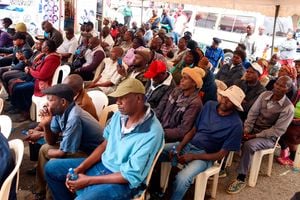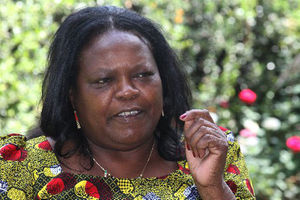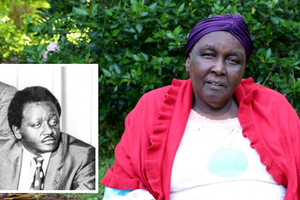
Some cases have been pending in Kenya's courts for decades.
When 90-year-old Miriam Wahu Kagiri took to the witness stand in November 2024 to testify, she was hopeful that justice would finally be served after being kept waiting in the court corridors for five decades.
Although she remained optimistic after concluding her evidence before Justice Anne Omollo, Ms Kagiri and other elderly members of Kiambu-Dandora Farmers Company Ltd had to contend with the reality that the next hearing date will be in June 2025.
Members of Kiambu-Dandora Farmers Company Ltd have been in the corridors of justice since 1972 when they filed their first case, fighting to recover an expansive land in Nairobi’s Eastlands area.
The parcel, situated in areas where Umoja and Kayole estates in Nairobi are established, ended up in the hands of individuals, private firms and in some cases, government institutions.
The company is claiming compensation of more than Sh3 billion from the government.
Ms Kagiri testified that she and other 200 members of the company were kicked out of the land by government officials in early 1970s.
Temporary structure
She said she bought four acres in 1966 at a cost of Sh1,400 and she recalled that she had put up a temporary structure on the land.
Members claimed that the government compulsorily acquired about 275 acres from them but later sold it to private companies, individuals and politicians, civil servants and business people — negating the intention to acquire it for public use.
The expansive land stretches from the railway line to the north, Kangundo Road to the south, the New Kenya Co-operative Creameries factory to the west and Coca-Cola to the east.
The society said members contributed money in 1966 to purchase the land from Khan Nawaz Abbas and Mehdi Khan.
They paid the Khans for the 818 acres and obtained the title on April 8, 1970. The title deed has been in possession of the successive trustees.
They were later embroiled in a land dispute with a rival company known as Dandora Housing Schemes Ltd but the case was referred to arbitration before the district officer, Makadara.
While the dispute was pending, the government offered to purchase from the trustees some 275 acres for Sh68,000, an offer which was declined. But the government opted to acquire it compulsorily and published a gazette notice for urban development.
They claim the notice did not specify which public body or public interest for which it was being acquired.
Koinange succession case
Another case that has been pending in corridors of justice is the succession matter involving the estate of Mbiyu Koinange, a former powerful minister in Jomo Kenyatta’s government.
Koinange died on September 3, 1981 intestate and the matter was filed in court the same year.
It was not until 2020 that Justice Aggrey Muchelule made a significant step in sharing the estate, that was estimated to be worth Sh14 billion then, between Koinange’s 12 beneficiaries.
But when things appeared to have settled, one of the parties went to the Court of Appeal, being dissatisfied with the sharing of the estate.
In the judgement, Justice Muchelule directed that Koinange's vast estate be shared equally among his 12 beneficiaries.
Koinange served in Kenyatta's Cabinet and briefly in president Moi's administration.
The estate had initially been distributed in 2015 but Justice William Musyoka left out two widows, Eddah Wanjiru Mbiyu and Margaret Njeri Mbiyu, who promptly filed an appeal and successfully petitioned to be included in the distribution.
JM Kariuki succession
Just like his 1975 death which has never been solved decades later, the sharing of his estate remains a thorny issue. The succession matter involving the estate of Josiah Mwangi Kariuki, popularly known as JM Kariuki, has been in court corridors for close to four decades.
The matter was filed in 1985 — about 10 years after his death.
For years, the family could not agree on legal beneficiaries of his estate. Justice (rtd) Lee Muthoga, who was the former MP’s lawyer and handled the dispute for 11 years, failed to strike a consensus, eventually handing the matter to the public trustee before it went to court.
The tug-of-war is between Ms Doris Nyambura Kariuki, JM Kariuki’s first widow — who is fighting a ruling that recognised Esther Mwikali and Ms Terry Wanjiku Kariuki— as widows.
In 2024, the family was given a chance by the principal judge of the High Court Eric Ogolla to resolve the matter through mediation but the parties could not agree.
The matter will be back in court in February 2025.
Wanyee estate
Another case that has been pending in court now for 35 years is the estate of Patrick Roki Wanyee, who died on February 6, 1984 without a Will.
A succession case was filed a year after his death.
Mr Peter Kamau Njui and Stephen Kamau Njuguna were the applicants against Ms Sharon Louise Wanyee (widow) and Boaz Reuben Shuma as respondents.
Ms Wanyee and Boaz Shuma petitioned the court to be granted permission to administer the estate.
The letters of grant were issued on May 27, 1985 but it was challenged by Mr Kamau and Njuguna. The two are grandsons of the late Stephano Wanyee and the late Teresia Wanyee.
One of the properties in dispute was Dagoreti/Riruta/63 measuring 20.6 acres.
Lawyer Eunice Lumallas for Ms Wanyee lamented the slow wheels of justice.
She stated that despite the matter being taken to court in 1988, it only got a second hearing of the main suit in 2021 after 33 years.
Ms Lumallas said she wrote a letter recently to the deputy Registrar of the Family division of the High Court, after the case was pushed to 2025.
Security for loan
Another long-running court case is a matter that was filed in 1990 between Standard Chartered Financial Services and its former customer over securities for loans.
In the 34-year-old dispute, King Woolen Mills is seeking Sh33.9 billion from the lender as compensation for its properties sold decades ago to recover a loan.
The bank was allowed to escalate the matter to the Supreme Court on grounds that a judgment in December 2022 by the Court of Appeal, which stated that new loans should be secured by registration of fresh securities, threw the law and practice of banking into confusion.
Further, the lender said the decision contradicts previous precedents and created uncertainty in the financial sector.
The bank, through Senior Counsel George Oraro, said the judgment by the appellate court created uncertainty in the financial sector, requiring the intervention of the Supreme Court.
The lender said that the practice has been that until a legal charge is discharged, it is a continuing security.
However, in the decision, the court held that the securities given by Galot Industries for a loan obtained by a sister company- Manchester Outfitters ltd- in 1982 (later known as King Woolen Mills), was discharged when the loan was converted into local currency.
The bank said the determination of the issues raised will not only have a direct and substantial impact on the manner in which financial institutions secure facilities advanced to their customers but will also lead to a determination on the scope of the court’s jurisdiction when sitting on appeal.
The company through lawyer Philip Nyachoti had opposed the second appeal to the Supreme Court arguing the lender had not demonstrated how the law and practice of banking has been thrown into confusion and uncertainty.
Interest on loans
Still to be determined, is a matter before the High Court and which was filed in 2003 by 188 people against banks over interest charged on loans without the approval of the minister decades ago.
The hearing of the matter has been stalled by numerous applications that were argued all the way to the apex court.
The first case was filed by Rose Florence Wanjiru in 2003 as she sought a refund of Sh38,960 from Standard Chartered Bank, which she argues was illegally levied because the bank had not obtained approval from the minister of finance.
The class action suit is seeking about Sh2 billion from lenders for interest charged on loans arguing that they suffered while repaying the loans, after changes were introduced to interest rates, in contravention of the law.
The case was initially dismissed by the High Court but it was later revived by the Court of Appeal in a ruling that found that the judge erred by dismissing the matter.
Banks, through Kenya Bankers Association, had also opposed an application by Ms Wanjiru to allow other borrowers who were also affected by the rates, to join the case but it was dismissed by the Appellate court and later the Supreme Court.
Mara Land case
A dispute over the 3,978.5-acre parcel of land in Narok has been pending in court since the year 2000.
Narok county government insists that the land is part of the world famous Maasai Mara Game Reserve but Mr Livingstone Kunini Ntutu says he was lawfully allocated the land in 1997 and a title deed issued in his favour in 2000.
Mr Ntutu said the controversial land was de-gazetted in 1992, removing it from the Maasai Mara National Reserve.
The county government on its part submitted that the title deed cannot stand because the process for its acquisition was unlawful and illegal and any document issued in contravention of the applicable law was a nullity and of no legal effect.
At first Mr Ntutu was fighting over the land with Ol Kiombo Ltd but the matter was settled by consent in May 2002.
Then Ol Kiombo Ltd acknowledged that Mr Ntutu was the registered owner of the land and the lease granted to it (Ol Kiombo) by the defunct Narok County Council was no longer binding or subsisting.
The Narok County Council challenged the agreement before the High Court in 2009 and the dispute was heard all the way to the Supreme Court, which referred the matter for fresh hearing at the Environment and Land Court.
Mr Ntutu told the court that a Gazette Notice No. 412/19923 was published and the Talek Area ceased to be part of the Maasai Mara National Reserve.
He said upon cessation of Talek Area being part of the Maasai Mara National Reserve, the Principal Land Adjudication Officer, Narok Adjudication District published a notice dated May 6, 1997, establishing an adjudication section known as the Talek Adjudication Section.
The county government opposed the case and contended that only 154 parcels of land were created during the adjudication process and the contested land did not form part of the degazetted area (CIS Mara/Talek/155).
Kahawa land
The Court of Appeal recently brought to an end a dispute between troubled Kamuthi Farmers Co-operative Society Ltd and the Nairobi county government, which has been in court corridors for the last 33 years.
The society lost the battle after the appellate court upheld an earlier judgment that the 415-acre parcel of land in Kahawa, was rightfully owned by the county government.
The case was filed in court in December, 1991 as Kamuthi Farmers Co-operative Society said the land initially belonged to defunct Kahawa Farmers Co-operative Society Limited.
While conceding that the defunct Nairobi city county intended to purchase part of the land from Kahawa Farmers, the later went into liquidation before the process was completed in 1989.
Elgeyo-Marakwet land dispute
In Eldoret, a 90-year-old woman has been in court for the last 33 years battling over a 44-acre parcel of land in Kapcherop, Elgeyo-Marakwet County.
Ms Cheptanui Sinyei Rotich, says she inherited the land from her late mother, but she accuses seven individuals, among them her two sons of allegedly grabbing the parcel and have been occupying the land illegally, since 1978.
She also accuses them of blocking the main feeder road to her homestead.
Her journey to seek justice through court started in 1992 when she filed a civil case before the High Court in Eldoret.
The elderly woman narrated in court how she was allegedly coerced into signing fraudulent documents using soot from her sufuria, accusing her opponents of capitalising on her illiteracy to disposes her of the land.
“They forced my thumbprint onto papers using soot from a sufuria,” she claimed.
Before moving to court, Ms Rotich said she attempted to seek justice was through mediation by then provincial administration under then Elgeyo Marakwet District Commissioner MO Chera in 1986 when the commissioner summoned the parties to appear before him.
She said she was the only one who showed up for the meeting.
She has been listed as a second plaintiff with Chelanga Kiprotich as a defendant. The matter proceeded in the High Court where the case was ruled in her favor after two years.
The defendant appealed the ruling at the Court of Appeal but the matter stalled for five years before the court eventually upheld the decision in her favour.
She added that an injunction stopping the eviction lasted for more than five years and when the court made a ruling ordering for eviction, local police were reluctant to implement it, delaying the eviction.
In a ruling in September 14, 2023, the Environment and Land Court in Eldoret, directed the Land Registrar and Land surveyor to survey the land.
Additional reporting by Titus Ominde and Simon Ciuri













